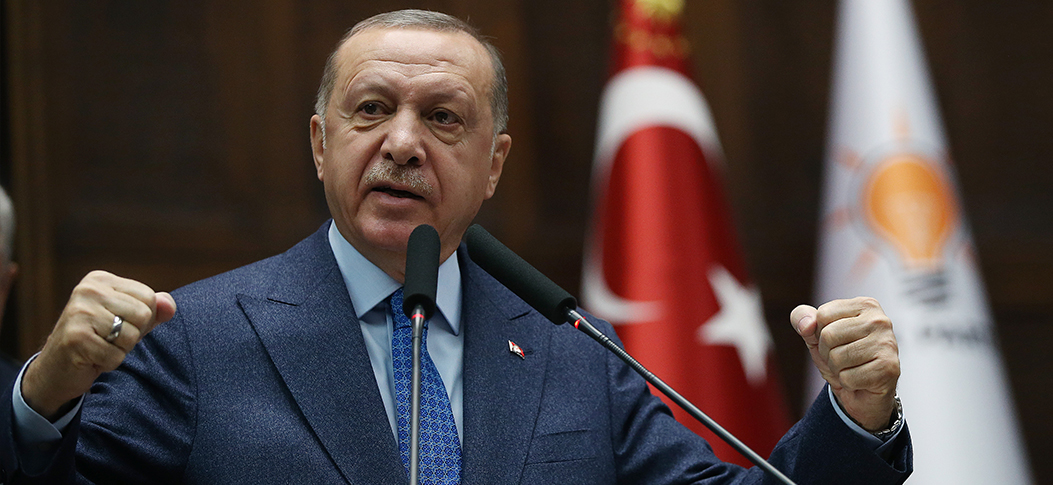President Erdoğan: Turkey will abide by cease-fire in Idlib, Syria so long as regime, its allies do the same

President and Party Chairman Recep Tayyip Erdoğan speaks at the parliament group meeting.
Turkey will respond heavily if its observation posts in northwestern Syria’s Idlib province are targeted, said the nation’s president on Wednesday.
“Turkey will do more than mere retaliation if its observation posts in Idlib are targeted,” Recep Tayyip Erdogan told ruling Justice and Development (AK) Party deputies’ meeting in the capital Ankara.
“We will stand against both the terror group [YPG/PKK] and sectarian regime forces,” he said, adding that Turkey will not get caught in another vicious cycle of terror that has claimed tens of thousands of lives in Turkey already.
He went onto say that Turkey does not aim to occupy or annex any territory of Syria or fight any power in the region, but only seeks to ensure the security of its territories and protect millions of people in Idlib who lived under the threat of massacres.
Erdogan said that in its operation in northwestern Syria, Operation Spring Shield, Turkey had the chance to test the capabilities of its defense industry, including armed drones, voicing his confidence that Turkey is ready to fight greater threats.
Turkey launched Operation Spring Shield on Feb. 27 in the region after at least 34 Turkish soldiers were martyred in an Assad regime airstrike in Idlib, and after repeated violations of previous cease-fires.
Under a 2018 deal with Russia, the Turkish troops were in Idlib to protect civilians from attacks by the regime and terrorist groups.
Erdogan said last week’s cease-fire in Idlib was achieved following Turkey’s military campaign there, giving Idlib residents the opportunity to live free of threats, adding that Turkey is closely watching developments on the ground.
“We are closely monitoring the deployment of the Assad regime and allied militants near the cease-fire lines,” he said, stressing that Turkey will abide by the cease-fire deal so long as the Assad regime and its allies do the same.
Under the cease-fire deal in Idlib, located just south of the Turkish border, all military activities are to end there, along with the establishment of a security corridor 6 kilometers (3.7 miles) to the north and south of the key M4 highway.
Joint Turkish-Russian patrols will also begin on March 15 along the highway from the settlement of Trumba – 2 km (1.2 miles) to the west of Saraqib – to the settlement of Ain al-Havr, under the deal.
Erdogan said a permanent solution to the Syria crisis should be in line with the country’s territorial integrity, but this is not possible while one-third of the country is occupied by the terrorist YPG/PKK.
"I believe Syria will enter [a period of] stability with a new constitution and free elections," he said. "With our full strength and sincerity, we will support every step [in Syria]."
MIGRATION CRISIS, THE EU, AND GREECE
The Turkish president also criticized Greece’s violations of human rights towards asylum seekers at its borders.
"There is no difference between what the Nazis did and video footage from the Greek border," he said.
"Opening fire on innocent people who have no aim besides saving their lives and providing a better future for their children ... is barbarism in the full sense of the word," he noted.
Erdogan also blasted the European Union’s attitude towards Turkey on the refugees.
"We don’t want any aid from anyone, we’re also not begging for someone. Our only demand is that the EU keeps its pledges made to our country," he said.
Turkey has complained that the EU failed to keep its promises to Turkey under a March 2016 deal on migrants.
"We will carry out our policies at the borders until our expectations are concretely meet on the opening of chapters on free movement, updating the customs unions, and financial support," he added, referring to the EU’s unkept promises.
Late last month, Turkey said it would no longer try to block asylum seekers from trying to reach Europe via land routes.
Thousands of asylum seekers have since flocked to Turkey’s Edirne province – which borders Greece and Bulgaria – to make their way to Europe.
Escalating attacks by the Assad regime and its allies in Idlib, Syria have sent a fresh wave of refugees toward Turkey’s border.
Turkey, which already hosts nearly 4 million Syrian migrants, more than any other country in the world, has said it would be unable to absorb yet another refugee wave.
CORONAVIRUS
Erdogan also spoke on recent developments concerning coronavirus in Turkey, which confirmed its very first case early Wednesday.
"Hopefully, Turkey will come out of this without any casualties. This is our wish. No virus is stronger than our measures," said Erdogan.
He also urged the public to carefully maintain personal hygiene to stem a possible outbreak in the country.
Coronavirus, officially known also COVID-19, was first detected last December in Wuhan, China.
The global death toll from COVID-19, the disease caused by the virus, is almost 4,300, with more than 118,000 confirmed cases, according to the World Health Organization.
The virus has spread to six continents and more than 100 countries.
NEW RULING PARTY DEPUTY
A newcomer to Wednesday’s ruling party meeting was Tuba Vural Cokal, a deputy for Turkey’s Mediterranean Antalya province, who recently left the opposition Good (IYI) Party to join the ruling AK Party.
Including Cokal, the AK Party now holds 291 seats in parliament.
The main opposition Republican People’s Party (CHP) has 139, the Peoples’ Democratic Party (HDP) 61, the Nationalist Movement Party (MHP) 49, the Good (IYI) Party 37, the Turkish Workers Party two, the Democrat Party (DP), Grand Unity Party (BBP), Felicity (Saadet) Party, and Democratic Regions Party (DBP) hold one each, and there are six independent deputies.

